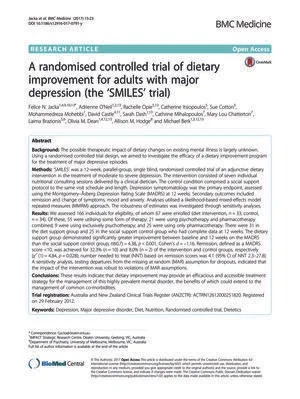Smiles Trial: Improving diet for adults with major depression
Publication date
30 January 2017
Authors
Felice N. Jacka
Adrienne O’Neil
Rachelle Opie
Catherine Itsiopoulos
Sue Cotton
Mohammedreza Mohebbi
David Castle
Sarah Dash
Cathrine Mihalopoulos
Mary Lou Chatterton
Laima Brazionis
Olivia M. Dean
Allison M. Hodge
Michael Berk
The Publication
The SMILES trial was the first RCT that set out to evaluate explicitly the link between depression and food. While earlier observational studies had shown that a good quality diet might help to prevent mental health disorders, there was little formal research on whether particular foods could be used to treat them.
The study recruited 67 participants with moderate to severe major depressive disorder and randomly assigned them to dietary intervention or control groups. The dietary intervention group received personalised dietary recommendations about how to adhere to a Modified Mediterranean Diet with regular consultations with a dietician. Notably, the intervention group also received a fish oil supplement. The control group received social support of the same duration and intensity.
After 12 weeks those in the dietary intervention group had significantly greater improvements in mental health than the controls, with a strong effect size. Notably, 32 % achieved full remission and were no longer classified as depressed. Furthermore, those who changed their diet the most experienced the greatest improvements in their depressive symptoms.
Our Response
This study highlights the direct interactions between nutrition and mental health. Although many understand that there is such a link, up until now high-quality evidence-based research has been lacking. This study adopted an RCT design, the gold standard of scientific research, so this result provides Class 1 evidence. The findings will encourage future research to provide nutritional alternatives in addition to conventional pharmaceutical approaches in the treatment of mental disorders. Given that mental health disorders are the largest cause of disability worldwide, this study promises to be seminal.

